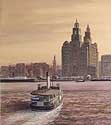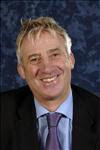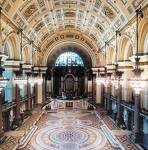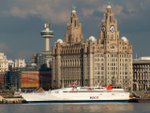

Liverpool City Council
From Wikipedia, the free encyclopedia
See City of Liverpool for other meanings
Liverpool City Council is the governing body for the city of Liverpool in Merseyside, England. It consists of 90 councillors, three for each of the city's 30 wards. The council is currently controlled by the Liberal Democrats and is led by Warren Bradley.

Liverpool has been a town since 1207, when it was granted its first charter by King John. It has had a town corporation (the Corporation of Liverpool) since before the 19th century, and was one of the corporations reformed by the Municipal Corporations Act 1835. The corporation created a police force in 1836.

Liverpool was granted city status in 1880. When local government was reformed in 1888 under the Local Government Act 1888 it was one of the cities to become a county borough, and thus independent of Lancashire. This situation persisted until 1974 with the Local Government Act 1972, when due to urban expansion and the accretion of a large metropolitan area, the city was made a metropolitan district of the metropolitan county of Merseyside. This saw the old corporation nomenclature abolished and the council reconstituted as Liverpool City Council.

In 1895 Wavertree, Walton and parts of Toxteth and West Derby were incorporated into the city with Fazakerley 1904 followed in 1913 by Gateacre, the rest of West Derby known as West Derby Rural in 1928 and finally Speke in 1932.

In 1986 the council of Merseyside was abolished and its functions devolved to its districts, but the county still legally exists. It should be noted therefore that Liverpool has never been a district council under Lancashire County Council.

In the late 1970s the City was run by the Liberal Party under Sir Trevor Jones. As part of their plans, a cost cutting exercise was drawn up, to reduce the councils costs by 25%. In 1979 the Conservative Party won a narrow victory in the General Election. Part of the Conservatives' plan was to impose a 25% cut on councils across the country. Liverpool City Council successfully negotiated an exception from this, on the grounds that they were already following Thatcher's policies and cutting 25%.

During the 1980s, the Militant movement gained control of several Labour councils including Liverpool, and challenged the national government on several issues. The leadership of the Labour Party was drawn into the controversy, culminating with Neil Kinnock's noted speech to Conference in 1985, denouncing Liverpool City Council without explicitly naming it. Derek Hatton and Eric Heffer, local MP and councillor, staged a walk-out.

Liverpool Labour Party successfully rooted out the militants within their midst and, following a brief period when the Liberal/SDP Alliance and Conservative Party ran the city in a caretaker capacity, Labour were returned to power with a massive vote of support by the Liverpool electorate.
In 1997, Labour was victorious in the General Election and set about reinvesting in UK cities after nearly two decades of urban decline. This benefited cities like Liverpool.
Further recent events:
* 1998 The Liberal Democrats win control of Liverpool City Council.
* 2003 Liverpool win the UK nomination of European Capital of Culture for 2008.
* 2004 Liverpool's waterfront and parts of the city centre are given World Heritage status.
* 2005 In November Lib Dem leader of the Council Mike Storey resigns after eight years following an email scandal in which he was accused of plotting to try to engineer the departure of the Council's Chief Executive. The Standards Board for England found that Cllr Storey had seriously breached the Code of Conduct, although he resigned prior to this and the Board accept this as penance.
* 2005 Cllr Storey was replaced as leader by Warren Bradley.* 2006 Planning decisions and policies of the Council threaten the World Heritage status
Wards 2004
Allerton and Hunts Cross Anfield Belle Vale Central
Childwall Church Clubmoor County
Cressington Croxteth Everton Fazakerley
Greenbank Kensington & Fairfield Kirkdale Knotty Ash
Mossley Hill Norris Green Old Swan Picton
Princes Park Riverside Speke-Garston St Michael's Hamlet
Tuebrook and Stoneycroft Warbreck Wavertree West Derby
Woolton Yew Tree
Political makeup
Elections are usually by thirds, in three of every four years. 2004 saw new boundaries and so all seats were contested.
Year Liberal Democrats Labour Liberals Others
2006 56 30 3 1
2004 59 27 3 1
2003 63 31 3 2
Year Control
2002 LD
2000 LD
1999 LD
1998 LD
1996 LAB
1995 NOC
1994 NOC
1992 NOC
1991 LAB
1990 LAB
1988 LAB
1987 LAB
1986 LAB
1984 LAB
1983 LAB
1982 NOC
1980 NOC
1979 NOC
1978 NOC
1976 NOC
1975 NOC
1973 NOC
The council has been under the Liberal Democrats' control since 1998. Prior to that it had alternated between Labour and No Overall Control since its reconstitution in 1974.
Sites
* Municipal Buildings, Liverpool Admin Centre. SOLD
* Liverpool Town Hall Ceremonial HQ.
* Calderstones House Recreation and Open Spaces Departments.
External links
Wikinews has news related to:
Liverpool
* Liverpool City Council
* Ward profile
* Liverpool-evil-cabal blog by Council Insider
http://en.wikipedia.org/wiki/Liverpool#Famous_Liverpudlians
Metropolitan County of Merseyside
City of Liverpool

Metropolitan Borough of Knowsley Metropolitan Borough of Sefton Metropolitan Borough of St Helens Metropolitan Borough of Wirral
Retrieved from "http://en.wikipedia.org/wiki/Liverpool_City_Council"
Category: Liverpool City Council
Powered by MediaWiki Wikimedia Foundation
* This page was last modified 10:06, 10 February 2007.














































No comments:
Post a Comment